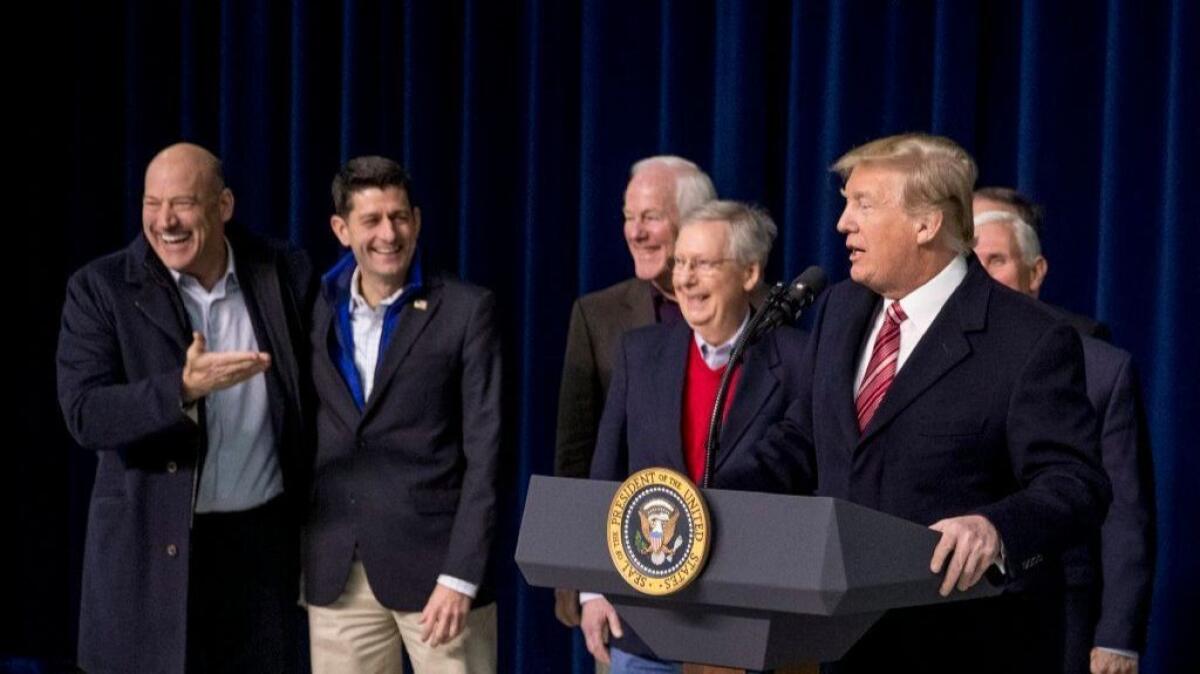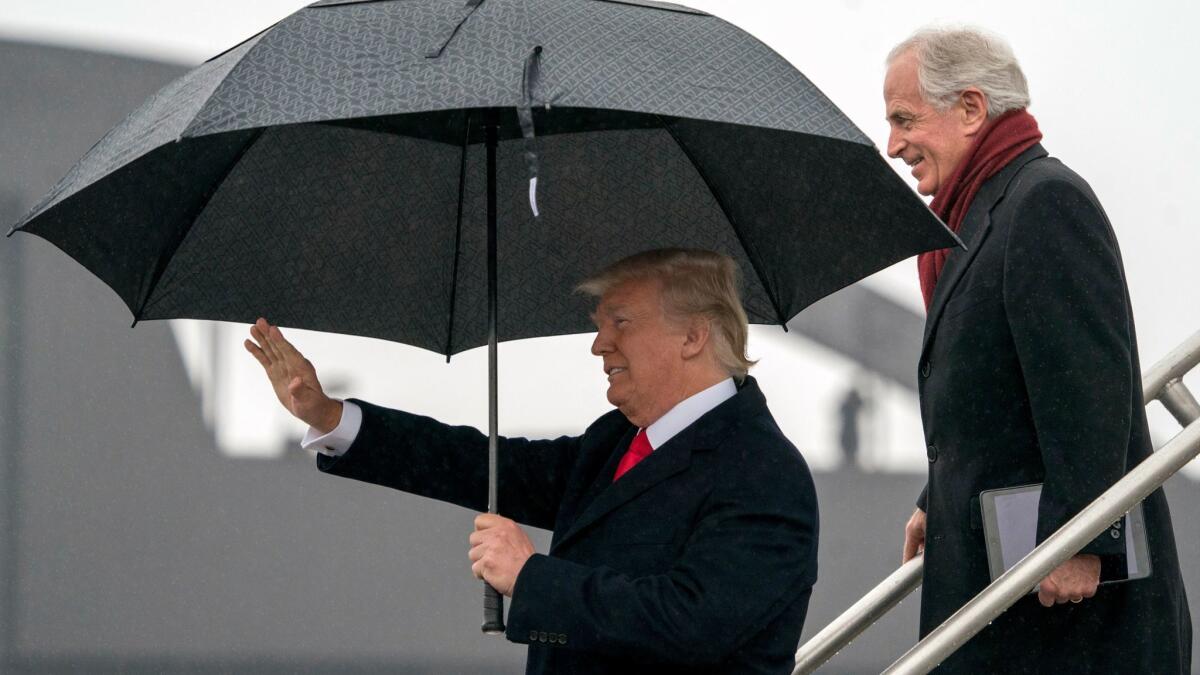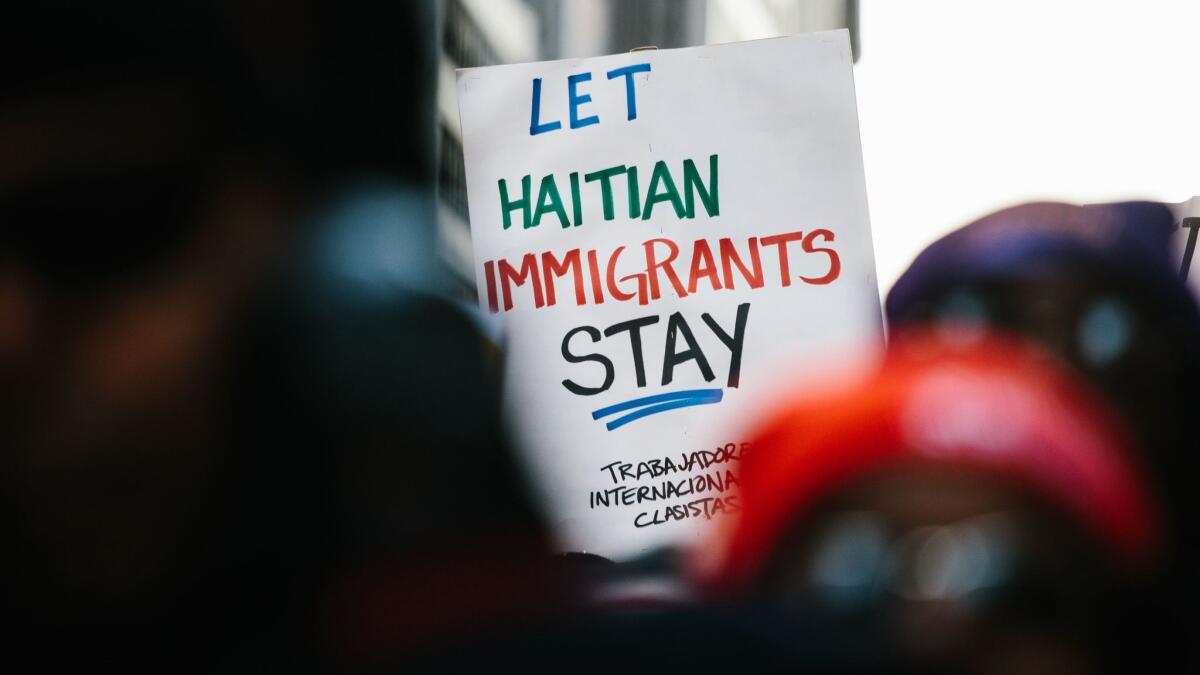Trump campaigned to remove the GOP’s ‘shackles.’ Instead, he’s often wearing them

Reporting from Washington — In the heat of his unlikely presidential campaign, Donald Trump declared himself free of the “shackles” of the Republican Party, promising to “fight for America the way I want to” and insisting he would never wish “to be in a foxhole with a lot of these people.”
Yet a year into his presidency, Trump has tightly tethered himself to that same Republican establishment and all but outsourced his agenda to its leaders in Congress. The “populism” so often cited as a major part of Trump’s victory has rapidly proved more rhetorical than real: On the one-year anniversary of his inauguration, Trump will be packing for a trip to Switzerland with much of his wealthy Cabinet to attend the annual Davos conference, a glittery gathering of the global elite.
“To me, populism was the Bannon position,” said Larry Kudlow, referring to the former White House strategist, now pariah, Stephen K. Bannon. “But Trump never bought into it.” Kudlow, a former Reagan administration official and commentator, has occasionally advised Trump.
Establishment Republicans, including some who have feuded with Trump, ended the year closer to him.
“The three areas where success has been achieved — on judicial nominations, on regulations and on tax policy — he’s right in the center of mainstream Republican politics, isn’t he?” said Tennessee Sen. Bob Corker, a Republican who has been one of Trump’s fiercest critics yet recently traveled with him on Air Force One after they united behind the tax-cut legislation.
The Trump who vowed to upend the Republican Party remains a force on Twitter and at campaign rallies, rattling many, including world leaders, and redefining the boundaries of presidential behavior. Yet as much as Trump has reshaped the office of the presidency in style and language, he has shape-shifted when it comes to most policy issues.
The one big exception remains on immigration, where Trump has powerfully backed the faction of the GOP — once a small fringe — who want to restrict not only illegal immigration, but legal entry to the U.S. Trump suggested bipartisan flexibility just days ago in a meeting with congressional leaders of both parties, telling them, “I’ll sign whatever immigration bill they send me.” Two days later, he shot down a compromise measure on the subject, with an expletive.
With historically low popularity, the distraction of a widening investigation into his campaign’s Russia ties and possible obstruction of justice, and, not least, his lack of government experience and loose grasp of policy details, Trump has depended far more than he likely ever anticipated on those he long castigated as architects of a rigged system.

Many Republicans harbor doubts, a few publicly, about Trump’s fitness for office and his damaging effect on the party’s brand. Yet almost all seem to have decided that he is the necessary vehicle for their policy agenda, particularly after he abandoned his occasional soak-the-rich talk to sign their $1.5-trillion tax-cut bill — a measure that dramatically reduced corporate taxes, lowered rates for top earners and raised the threshold for paying taxes on multimillion-dollar inheritances.
“At this point, it just appears that candidate Trump was a part in a play, and Donald played candidate Trump rather well. And now he’s playing another role,” said Henry Olsen, a senior fellow at the right-leaning Ethics and Public Policy Center and author of “The Working Class Republican: Ronald Reagan and the Return of Blue-Collar Conservatism.”
Many of those who feared Trump might redefine the party in his populist-nationalist image – anti-Wall Street, anti-immigration, anti-free trade and neo-isolationist — find themselves likening his economic policy to date to that of past party leaders.
“This was never a ‘punish the rich’” tax plan, said Kudlow. “He’s not a ‘punish the rich’ guy. Just the opposite. He wants to reward.”
Senate Majority Leader Mitch McConnell, the Kentucky Republican who months ago drew Trump’s blame for the party’s failure to overturn President Obama’s Affordable Care Act, grinned widely earlier this month as he stood beside the president at Camp David, where they plotted the party’s next moves with other Republican congressional leaders.
“From a right-of-center point of view, 2017 was the most consequential year in the many years that I’ve been here in Congress,” McConnell said, employing a bit of Trumpian hyperbole and ignoring the setbacks and unfulfilled promises.
The proposals that are Trump’s biggest departures from the traditional Republican course — on immigration, trade and a “trillion-dollar” infrastructure plan — remain works in progress. In those areas, Trump has elevated ideas once limited to the party’s fringe.
Just five years ago, Republican leaders’ “autopsy” on losing the 2012 presidential election concluded that the party was jeopardizing its future by alienating the growing population of Latinos, and “must embrace and champion comprehensive immigration reform.” Yet Trump won the next contest by doing just the opposite.
As president he’s embraced an effort to reduce legal as well as illegal immigration, opposes a system for uniting relatives, and proposes financial, education and skills criteria as requirements for legal entry. His early order sharply restricting immigration from some mostly Muslim-majority countries survived legal setbacks, in moderated form.

More recently he’s told nearly 300,000 Salvadorans, Haitians and Nicaraguans, who’ve long had temporary residency, to leave by next year; many have children born here as U.S. citizens. He ordered an end by March to protections from deportation for about 700,000 so-called Dreamers who came to this country illegally as children, though his order has been blocked temporarily in the courts. And he has privately railed against taking in any people from Haiti and what he called “shithole” African countries.
On another signature issue, Trump has not yet followed through on promises to kill trade deals and punish China as a currency manipulator. The North American Free Trade Agreement remains in force after more than 20 years. Trump still threatens to kill it if he is unsatisfied with the result of renegotiations with Mexico and Canada but has repeatedly pushed back the deadline for negotiations. In a recent interview with the Wall Street Journal, he said no action would take place until after the Mexican presidential election, scheduled for July 1.
Trump’s withdrawal from the 12-nation Trans-Pacific Partnership, which was a bipartisan initiative of his two predecessors, but largely dead by the time Trump took office, has been his most consequential move on trade. Formally quitting the pact cheered blue-collar supporters but worried economists and foreign policy analysts who say China is usurping American influence in the region.
While the Republican Party was long committed to free trade, it did have a growing faction of protectionists. Trump has tipped the balance in their favor.
Lanhee Chen, a pro-trade Republican and former policy advisor to Mitt Romney, now at the conservative Hoover Institution, said, “What Trump has done is not so much shifted the party but given voice to a part of the party” on immigration and trade.
“One of the things that Trump’s election may have exposed,” Chen added, “is that there are a lot more Americans that are hard-edged on immigration than you think.”
He and other traditional conservatives have been more surprised that Trump moved their way so swiftly on other economic policy, jettisoning promises to make his fellow wealthy Americans pay more taxes. Most notably, Trump abandoned efforts to close a loophole known as carried interest which lets hedge fund managers pay lower rates. Not only did Trump forgo that fight, he also pushed in final negotiations to lower rates on top earners even further.
Newt Gingrich, the former House speaker and Trump ally who generally gives him credit as a transformational figure, said, “There’s not enough up side to be worth the effort” to move the Republican Party on taxes. “It goes against the whole core culture of the party.”
Trump and his allies now argue — echoing supply-siders back to Reagan’s time — that the tax cuts will help the middle class as the benefits for the wealthy and businesses are more widely shared. Also, they point to increases in the standard deduction and a larger credit for parents. Yet independent analyses show that, over time, even more of the tax cuts’ benefits will go to high earners and corporations.
“This is the biggest political bait-and-switch I’ve ever seen,” said Jared Bernstein, a top economic advisor in the Obama administration.
Bernstein said Trump largely let congressional Republicans write the bill — a contention that Republicans have been happy to confirm.
The administration “basically let the four horsemen over here drive it,” said Corker, referring to Republican leaders McConnell and House Speaker Paul D. Ryan of Wisconsin and the chairmen of the House and Senate tax-writing committees.
“Look, we’ve got a president who’s more big-picture focused,” Corker added. “I do think, on the details, that he does leave a lot of that to House and Senate members. And actually, I think that’s a good thing.”
Twitter: @noahbierman
More to Read
Get the L.A. Times Politics newsletter
Deeply reported insights into legislation, politics and policy from Sacramento, Washington and beyond. In your inbox three times per week.
You may occasionally receive promotional content from the Los Angeles Times.











